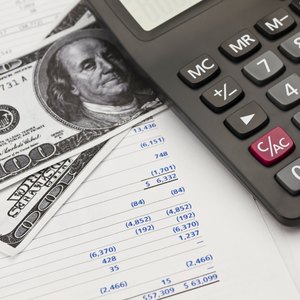
Garnishment is a legal tool creditors use to collect unpaid debts. The process forces your employer to send some of your paycheck each week to your creditor until the debt is settled. A creditor in Alabama can also garnish your bank account. Alabama law limits how much money a creditor can garnish from each paycheck, and the rules vary according to the type of debt you owe. In some circumstances, state law gives debtors the right to stop or prevent the garnishment.
How Creditors Garnish
Alabama law states if the debt is consumer credit, such as unpaid credit-card debt or medical bills, a creditor must go to court to obtain a judgment against you. The judgment is an official decree that confirms you owe the creditor money. The court notifies your employer to start garnishing your wages. The garnishment is a court order, so even if your boss likes you, she can't refuse.
According to the Nolo legal website, certain debts don't need a court order in Alabama, though the creditor must still notify you before garnishing:
- Defaulted student loans
- Unpaid income tax
- Child support debts
Limits on Garnishment
Alabama has adopted the federal limits on how much of your disposable earnings creditors can garnish for consumer debts. Creditors can garnish either 25 percent of your earnings or take everything greater than 30 times the federal minimum wage. They must use the method that provides the smaller amount. Disposable earnings are what is left after your employer takes out for taxes, child support and any other legally mandated deductions. At time of writing, federal law prevents garnishment if your take-home pay is less than $217.50.
Types of Debt
The limits on garnishing disposable earnings are different for certain types of debts:
- Child support can take up to 65 percent, depending on your family's situation and how far behind you are.
- If you default on a student loan, the limit is 15 percent or 30 times the federal minimum wage.
- Garnishment for unpaid tax bills depends on your tax situation and the number of dependents you have.
Blocking Your Creditors
In most cases, the court notifies you that your employer is going to garnish your wages. If you can show the judge that you can't support your family on what is left after garnishment, you may be entitled to an exemption. Once you get notification, list all of your assets on form PS-20 -- Motion to Stop Wage Garnishment -- and have it notarized. You can file this form with the court without an attorney. The creditor has 15 days to respond and argue in favor of continuing the garnishment.
Non-Wage Garnishment
A non-wage garnishment targets money other than your wages, such as a bank account or self-employment income. A creditor still needs a court order to collect a consumer-credit debt this way, but the garnishment limits are higher. A creditor garnishing your bank account, for example, can collect the entire debt immediately if the money is in your account. To stop a bank garnishment, you'd have to show the court that the funds come from a garnishment-proof source such as Social Security benefits.
References
- Alabama Legal Help.org: Wage Garnishments
- FindLaw: Alabama Code Section 5-19-15: Garnishment
- Nolo: Alabama Wage Garnishment Laws
- Grainger Legal Services: Garnishment of Bank Accounts
- Alabama Legal Help: Motion to Stop Wage Garnishment
- Alabama Legal Help: Request to Stop Garnishment of Bank Account
- AllLaw: Can Creditors Get Your Income if You Are Self-Employed?
- Department of Labor. "Garnishment." Accessed Feb. 13, 2020.
- Michigan Legal Help. "An Overview of Garnishment." Accessed Feb. 13, 2020.
- Cornell Law School Legal Information Institute. "Consumer Credit Protection Act of 1968 -15 U.S. Code § 1673.Restriction on Garnishment." Accessed Feb. 13, 2020.
- Cornell Law School Legal Information Institute. "Consumer Credit Protection Act of 1968 - 15 U.S. Code § 1672.Definitions." Accessed Feb. 13, 2020.
- Department of Labor. "Fact Sheet 30: The Federal Wage Garnishment Law, Consumer Credit Protection Act's Title III," Page 2. Accessed Feb. 13, 2020.
- United States Department of Labor. "Minimum Wage." Accessed Feb. 13, 2020.
- Department of Labor. "Fact Sheet 30: The Federal Wage Garnishment Law, Consumer Credit Protection Act's Title III," Page 3. Accessed Feb. 13, 2020.
- California Courts. "If You Do Not Pay Your Judgment." Accessed Feb. 13, 2020.
- Office of the U.S. Courts. "Discharge in Bankruptcy – Bankruptcy Basics." Accessed Feb. 13, 2020.
- Cornell Law School Legal Information Institute. "United States Bankruptcy Code - 11 U.S. Code § 523.Exceptions to Discharge." Accessed Feb. 13, 2020.
Writer Bio
A graduate of Oberlin College, Fraser Sherman began writing in 1981. Since then he's researched and written newspaper and magazine stories on city government, court cases, business, real estate and finance, the uses of new technologies and film history. Sherman has worked for more than a decade as a newspaper reporter, and his magazine articles have been published in "Newsweek," "Air & Space," "Backpacker" and "Boys' Life." Sherman is also the author of three film reference books, with a fourth currently under way.

